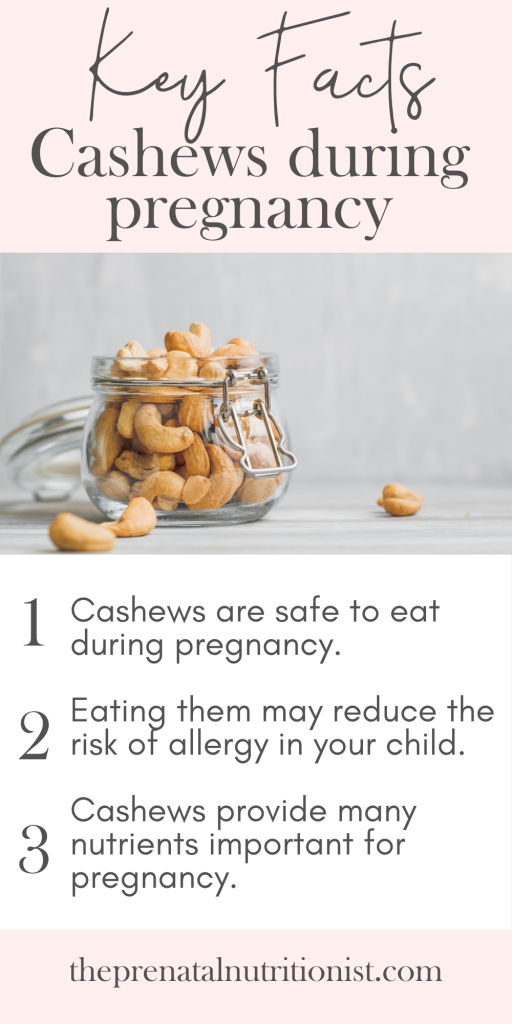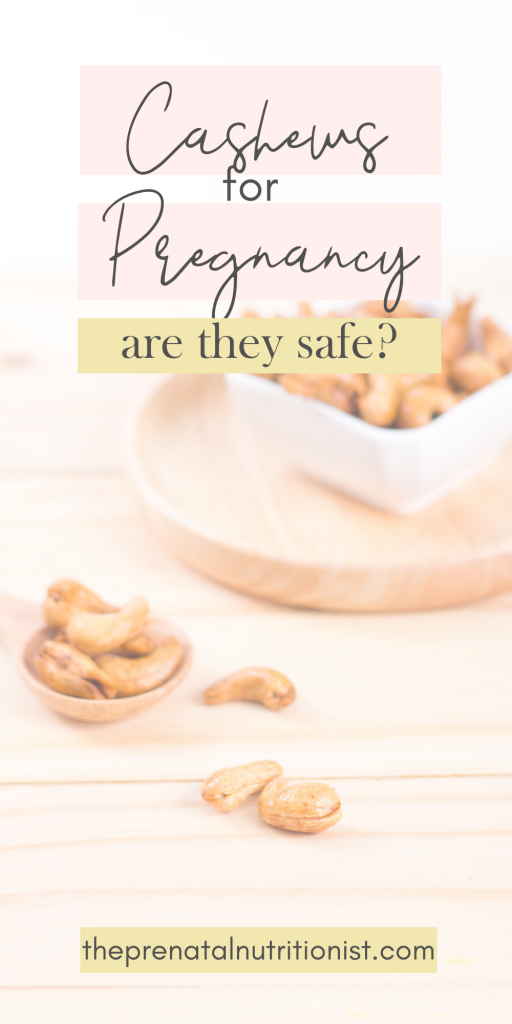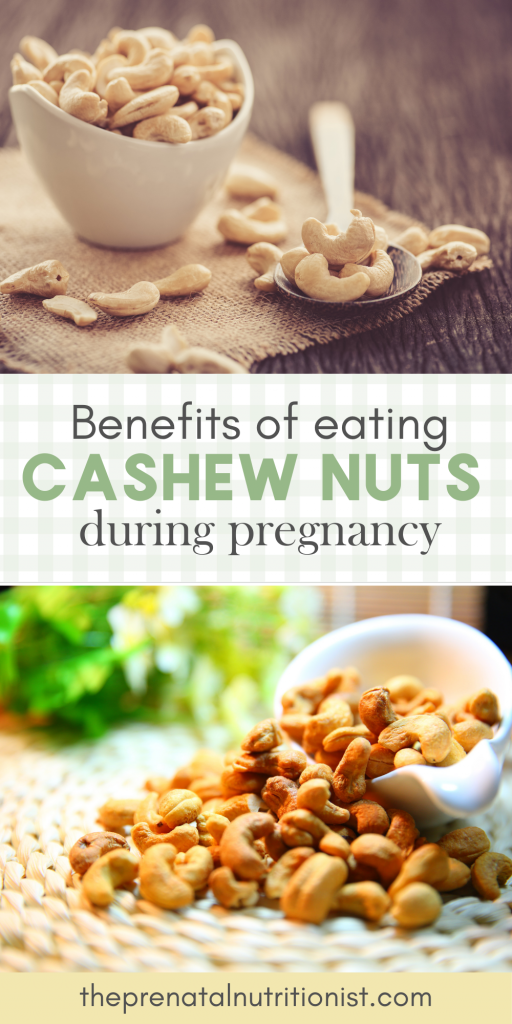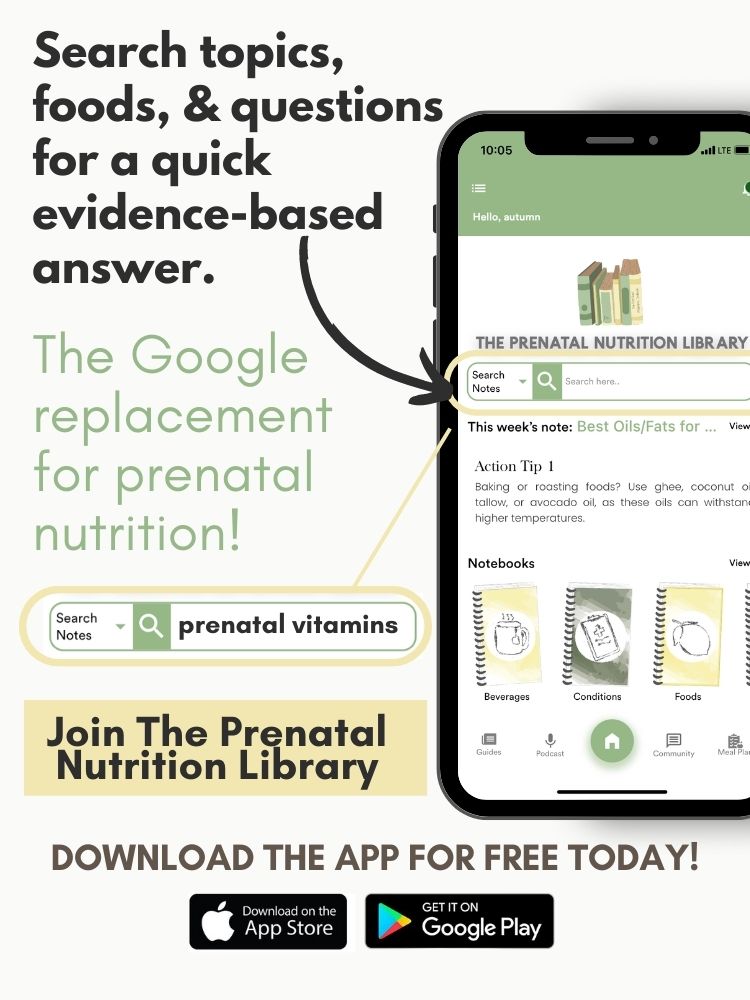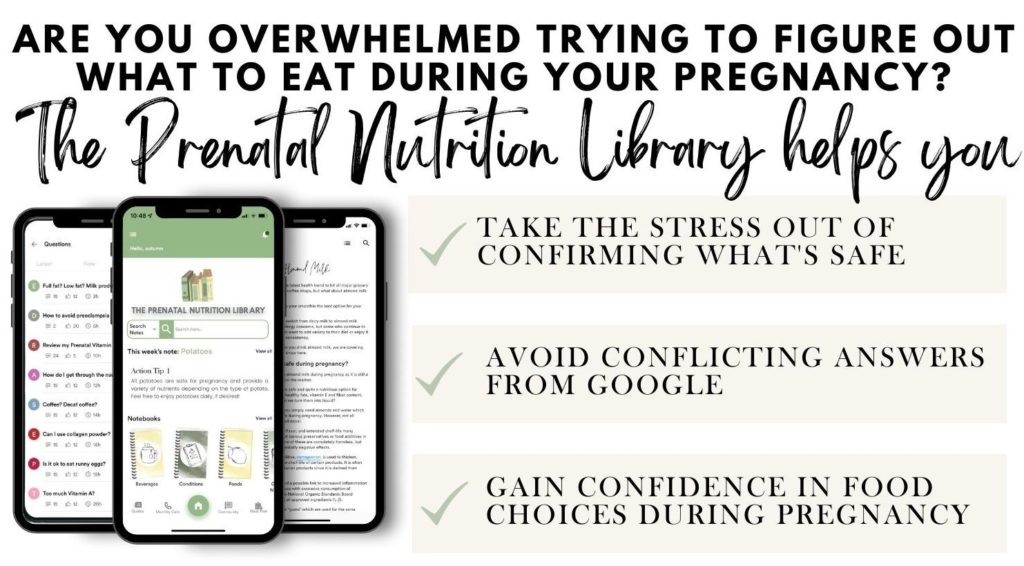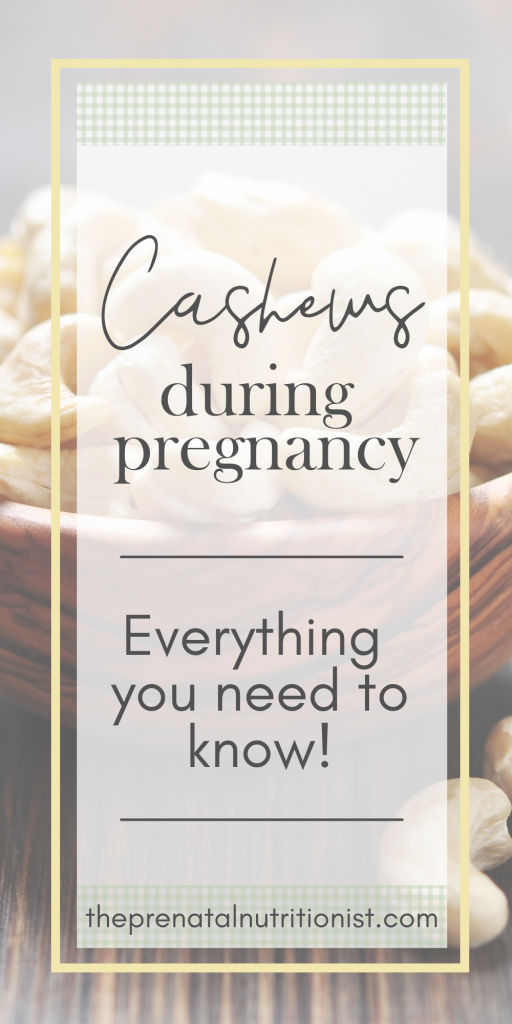
Cashews are one of the foods you might already consume on a regular basis. There’s a lot of conflicting information out there regarding eating tree nuts such as pistachio, almonds, and of course cashew during pregnancy. So you might be wondering what the facts are and whether or not they are safe to eat while you’re growing another human. These are important questions. Are cashews safe during pregnancy? Should you eliminate them from your pregnancy diet? Should you eat more cashew? If so, how much more?
Being mindful of what you’re putting into your body is always important. It’s even more crucial during pregnancy since fetal development is affected by what mothers eat. So the fact that you’re reading up on pregnancy nutrition is wonderful!
A poor diet can have a negative long-term impact on your child’s health. So as expectant mothers, it’s important you’re mindful of the food you consume. Having a steady intake of nutrients reduces the risk of health deficiencies for your soon-to-be Earth-side bundle of joy.
Well, no worries Mama! Because today we’re talking all about eating cashew nuts during pregnancy, the benefits of eating cashew during pregnancy, and how to eat cashews while you’re pregnant.
Everything You Need To Know About Eating Cashews During Pregnancy:
First things first. Is it safe?
Several studies have determined that eating nuts during pregnancy is safe unless you have a food allergy. But it gets better. There are also many health benefits both for the mother and baby.
Nuts can actually help improve a child’s neuropsychological functions if consumed during the early stages of fetal development and can aid in avoiding future nutrient deficiencies.
There is also evidence to suggest that eating nuts during pregnancy can reduce the chances of your child having a nut allergy after birth. In fact, a study from JAMA Pediatrics concluded that children of a non-allergic pregnant woman who ate nuts five times per week or more during fetal development turned out to have the lowest risk of peanut or tree nut allergies.
Cashews in particular are a rich source of essential nutrients, vitamins, and macronutrients, thanks to their high content of iron, fiber, and omega 3 fatty acids. However, cashews are a nut that can be higher in saturated fats. Consider other nuts for healthy fats. Here is the nutritional breakdown of cashew nuts according to Medical News Today.
Just one ounce of unsalted and un-roasted cashews (about 28 grams) has:
- 157 calories
- 5 grams of protein
- 12 grams of fat
- around 9 grams (90 mg) of carbohydrates
- 0.9 g of fiber
- 10 milligrams (mg) of calcium
- 1.89 mg of iron
- 83 mg of magnesium
- 168 mg of phosphorus
- 187 mg of potassium
- 3 mg of sodium
- 1.64 mg of zinc
- vitamins C and B
- 7 micrograms (mcg) of DFE folate
All of the nutrients above are important for overall nutrition and optimum weight gain, and especially sacred during pregnancy. But let’s dive deeper into the nutritional benefits of these delicious tree nuts during pregnancy and if they can aid in a healthy pregnancy.
The Benefits Of Eating Cashew Nuts During Pregnancy
Read below for Cashews During Pregnancy: Everything You Need To Know including the nutritional benefits for a healthy pregnancy!
For starters, it reduces the risk of your child having a cashew allergy:
As mentioned before, studies show that children of non-allergic mothers that consume tree nuts on a regular basis during fetal development have a lesser chance of being allergic to that nut. So it’s worth upping your intake of cashews to potentially reduce the chances of a tree nut allergy during childhood.
Eating cashew nuts during pregnancy helps prevent muscle cramps, headaches, and migraines:
This benefit comes from cashews being pack-full of magnesium. This nutrient has been shown to reduce how often a pregnant woman experiences leg cramps, migraines, and other nervous system symptoms.
Cashew nuts help keep things moving in your digestive system.
Pregnant women know the struggles of having regular bowel movements and uneasy body fluids during pregnancy. Managing GI issues during pregnancy is just a part of the process. As stated above, cashews are packed with magnesium and fiber. Both contribute to consistent, healthy digestive tracts and therefore bowel movements. So I say, bring on the cashew!
Cashews can help prevent an iron deficiency:
Since cashews are a naturally rich source of iron, they can help both you and your unborn child fight an iron deficiency. Munching on these nuts will help you reach the minimum daily intake of iron during pregnancy. This contributes to preventing anemia and fatigue, as well as promoting red blood cell production. You need iron during pregnancy to produce more blood for you and your growing baby, so consuming iron-rich cashews is absolutely important.
The folate found in these nuts reduces the risk of birth defects:
Folate is crucial for fetal development. It helps form the neural tube of the fetus, which can help prevent some major birth defects of the baby’s brain and spine. It also aids in the formation of the baby’s heart and overall circulatory system. The folate in cashews is FOLATE, the naturally occurring kind, not folic acid.
Cashews are a good source of protein, benefiting cell repair during pregnancy:
Thanks to their high levels of protein, cashews help with the production of amino acids and do a great deal when it comes to cell repair. Protein repairs muscle tissue and damaged cells, helping pregnant women to stay healthy and strong.
Cashew is a rich source of Vitamin K:
Vitamin K is essential for pregnant women. It contributes to blood clotting and helps maintain steady blood pressure levels and manage high blood pressure. Another major benefit is reducing the chances of Vitamin K deficiency in the fetus, a bleeding disorder, and hemorrhagic disease that can affect newborns. Cashew nuts are a great way to get more vitamin K and other vitamins and minerals in your diet.
Different Ways To Eat Cashew During Pregnancy
As a quick snack to munch on:
This one is the easiest of them all. Just keep an air-tight container with cashew tree nuts in your purse, pantry, bedside table, anywhere you typically get the urge to snack. That way you can easily grab and snack on cashew whenever your belly starts to rumble! Cashews protein content (along with the other benefits noted) make them a great snack option.
Make or buy some cashew milk:
Cashew milk is a healthy and environmentally-friendly alternative to regular milk. It has tons of health benefits, a great taste, a smooth consistency, and fewer calories. You can make it at home or buy it at almost any grocery store. Simply drink it straight, add it to your morning coffee, a smoothie, or use it to make some creamy pasta!
Mix it with dry fruit to make your own homemade trail mix:
This is another no-brainer. You can snack on trail mix with flavors other than cashew and get all the nutrients! Add cashew nuts, dried fruit, pretzels, other nuts, and even chocolate chips or your favorite small candy. Let your pregnancy cravings go wild and make an extra versatile mix.
As cashew nut butter:
If you’re a fan of peanut butter, you should give this one a go. Cashew butter is just as tasty! Make a cashew butter and jelly sandwich. Put some on a banana! Or you can make cookies, brownies, and even smoothies with this delicious ingredient.
Add it to your next roasted vegetable sauté:
To include a little protein in a veggie meal, try chopping cashews into small pieces and mixing them into any sautée. It’s a nice way to add some extra flavor and crunch!
Use cashew nuts as the crunchy topper for any salad:
Cashews go incredibly well with fresh leafy greens and a nice vinaigrette. You can include them whole or chopped on any salad to add a crunchy element to the dish. This super filling summer salad calls for sliced almonds but you could totally swap them out for cashews!
Precautions When Eating Cashew During Pregnancy
Stick to an ounce of cashew nuts per day:
Consuming more than one ounce per day of cashews can lead to digestive uneasiness for some. It’s better to consume these nuts in moderation, on a regular basis than going wild. Honestly, all things consumed in moderation is a good rule to live by.
Make sure to eat plain, organic cashews:
Salted or spiced cashews can be tremendously high in sodium, which is something you don’t want too much of during pregnancy. Don’t eat salted or spiced in excessive amounts.
That being said, a roasted and lightly salted option is completely fine. Be sure to also look out for oils listed in the ingredients. If possible, choose an organic option.
Don’t consume cashews if you have an allergy:
No benefit can overthrow the negative effects of consuming cashews if you’re allergic to them. Steer clear of these tree nuts if you know you have an allergy.
Check with your doctor before including cashews in your pregnancy diet:
It’s always best to be extra safe and talk it out with your doctor about potential side effects before making any change to your diet during pregnancy. So let your doctor know you’re thinking about consuming cashews on a regular basis during pregnancy and get their expert advice. If you have had previous kidney stones, they might advise you to limit your intake of cashews to no more than a few times per week.
Will you be including cashews in your pregnancy diet?
Now that you know all about these nuts and the benefits of cashew nuts and how you and baby can benefit from them, hopefully, you’re ready to add cashew nuts to your diet!
If you have any questions, feel free to leave a comment below! The health benefits of cashew during pregnancy are amazing, as long as you don’t have any particular allergies or conditions. You can be as creative as you want when it comes to adding them to your daily routine. Looking for other pregnancy-friendly nuts like almonds, walnuts, or pistachios? Check out The Prenatal Nutrition Library!
So go nuts! Pun fully intended.
